This installment of the First Families Chornicles
was the third published in the series and was originally published
in two parts. But here it is all together for the first time,
along with the entire series.
In the category of First Families,the Ornes are relative newcomers
to Marblehead. When Joshua Orne arrived here in 1704 to marry
Elizabeth Norman, the granddaughter of Moses Maverick, one of
the original Selectmen, the Dolibers and Peaches had been here
for many years. But the Ornes reamined in Town, leaving their
mark year after year, decade after decade, and century after
century down to the current day, and undisputably one of the
most prominent families in the history of Marblehead.
The Hornes, as their name was known, had arrived in Salem, probably
by 1630, and were somewhat prosperous and active in Salem affairs.
They were tailors, cordwainers, and constables. John Horne, Sr.
was even granted a license in Salem in 1669 to sell "strong
water at retail." As Thomas Lee explained in "The Ornes
of Marblehead," the Ornes of Salem, "while well known,
have not taken such a prominent part in public affairs as their
Marblehead kinsmen."
Joshua Orne, born in Salem in 1677, came to Marblehead in 1704.
He was a cordwainer, which is a leather or shoe worker. He later
became a Justice of the Peace and a member of the General Court,
the Massachusetts legislature. His son, grandson, and greatgrandson
were all to follow him in representing Marblehead in the legislature.
He had ten sons and two daughters. His eldest son, known as Deacon
Joshua, was the father of famed Marblehead patriots Azor Orne
and Major Joshua Orne.
Deacon Joshua was a wealthy merchant, well-educated and charitable.
As well as being a member of the General Court, he served several
terms as a Selectman (1726,1738,1746, 1746, 1749 and 1750). When
he died, he left a large estate including two wigs, two swords,
and a slave named "Ceasar."
Colonel Azor Orne with his half brother, Major Joshua were fervent
patriots and supporters of the revolutionary cause. He and Joshua
served together on the Committees of Correspondence, formed to
call to the world's attention the
Colonel Azor Orne, from a portrait
by Copley, in the possession of Mr. Mary F. Boles of Marblehead.
grievances of the colonists. The Colonel, a title he received
in the local militia, was elected to the First Continental Congress,
but declined the post "as the conditions of [his] private
affairs was such as to prevent [his] acceptance." Although,
according to Mr. Hubbard who delivered the sermon at the First
Congregational Church in Marblehead a few days after the Colonel's
death, Colonel Orne "always regretted his lack of a college
education, since on this account he modestly declined some important
government offices."
In 1773 Azor Orne, Elbridge Gerry, and the Glovers, Jonathan
and John, petitioned the Town to build a smallpox hospital on
Cat Island, now known as Children's Island. The Town decided,
rather than building the hospital itself, to permit Orne and
his group to build it as a private enterprise "so long as
inhabitants of Marblehead would be in no danger of infection."
When the Marbleheaders learned of this, they became very upset
and arranged a Town meeting to have the permission withdrawn.
The proprietors, having already purchased all the building material,
agreed to forego thier plan, so long as the Town would purchase
their building materials at cost. The Town refused. Angry, the
propietors went ahead and constructed the hospital, despite the
Town meeting vote.
They successfully treated hundreds of smallpox victims. Still,
twenty-two cases of smallpox were reported in Town, and the Marbleheaders
rose up in anger. Fearful now of being lynched, Orne and his
partners shut the hospital down. Rumor spread quickly, however,
that the group planned to reopen it. In January, 1774, a band
of Marbleheaders raided the island and burned the hospital to
the ground.
Not one to be embittered, Colonel Orne continued to be active
in local and national affairs. In 1775 Colonel Orne joined fellow
Marbleheaders Jeremiah Lee, a wealthy merchant, and Elbridge
Gerry, later to be Vice President of the United States under
James Madison, at Weatherby's Black Horse Tavern on the road
between Cambridge and Lexington. There the townsmen joined Sam
Adams and John Hancock as fellow members of the important Province
Committee of Safety and Supplies. They were roused from their
beds on the 19th of April as the British marched toward Concord.
The patriots hid in the cornfield behind the tavern while the
British searched the tavern for members of the "Rebel Congress."
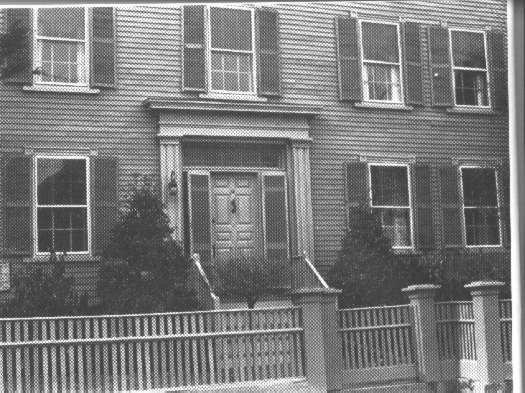
To support the Revolution, Azor also loaned a great deal of money
to the cause. He remained active in government throughout the
rest of his life. He was a delegate to the
18 Orne Street -- still standing
and beautifully maintained, the ancestial home of Colonel Azor
Orne.
Massachusetts Constitutional Convention, voting in favor of ratification
of the new U.S. Constitution, and was named as Elector for the
coutnry's first Presidential election.
Samuel Roads in his History and Traditions Of Marblehead,
notes that in the year 1799 "little of especial local
interest to the people of Marblehead appears to have occurred"
except the death of Colonel Azor Orne. Orne Street is named for
the Colonel. The home he built in 1708 at 18 Orne Street still
stands, "suggesting interesting reminiscences, related by
the old people a generation since, of the days when its hospitable
doors were thrown open wide to receive distinguished guests,
and the negro slaves sang merrily while busy about their work,"
stated Roads.
Major Joshua Orne was equally active in the Revolution. He was
a member of the committee which ran Marblehead's company of minutemen
and a member of the committee which handled the capture of ships
made at sea. The major was particularly suited to this task since
he was part owner of several privateers, privately owned ships
authorized by the Continental government to attack enemy ships.
Major Orne, a wealthy merchant, was well educated, like his father
Deacon Orne. The Major graduated fifth from his Harvard Class
of 1764. His thesis was a denunciation of the slave trade in
the colonies. After the Revolution, he was named a trustee of
the public schools in Marblehead, whose job it was to "employ
a schoolmaster qulaified to teach English, Latin, and Greek language,
writing, and arithemtic."
One of the major's children, Joshua, Jr. was born on board his
vessel in New York harbor on the way north from St. Thomas.
Joshua, Jr.'s cousins, William, Azor, and Joshua, the sons of
Colonel Azor Orne, had less auspicious births, but no less notable
lives. Azor, the eldest son, was killed in a duel. His brother
Joshua was the fourth generation in a direct line to represent
Marblehead in the legislature. Joshua served in General John
Glover's Marblehead Regiment as a lieutenant. While marching
to the Deleware River prior to rowing George Washingon and his
2000 troops across, Joshua became so cold and numb that he feel
into the snow. The regiment marched past him. Only sheer luck
saved him, when one of the men in the rear chanced to stumble
over him. He survived this experience, only to die thirty years
later as he fell coming down the steps of the American Consulate
in Bordeaux, France.
Joshua's brother, William, was in command of the brig Betsey
during the War of 1812, when it was captured by the British frigate
Guerriere. Captain Orne was taken on board as a prisoner. He
was aboard Guerriere when she met USS Constitution in a battle
off New York. (It was during this battle that Constitution earned
her nickname as "Old Ironsides" when they saw Guerriere's
cannonballs bounce off Constitution's oak planks.) In his diary
Captain Orne vividly recorded the battle:
Captain Dacres (of Guerriere) politely said to me, "Captain
Orne, as I suppose you do not wish to fight against your own
countrymen, you are at liberty to go below the waterline."
All Guerriere's masts were shot away, and, as she had no sails
to steady her, she lay
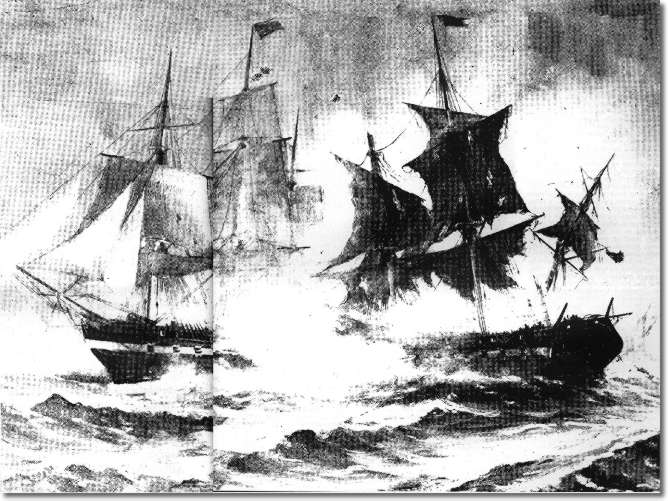
Captain William Orne was a prisoner on board the British Frigate Guerriere (left) when she was attacked and destroyed by USS Constitution.
rolling like a log in the trough of the sea. Many of her men
were employed in throwing the dead overboard. The decks were
covered with blood, and had the appearance of a butcher's slaughter-house...Some
of the petty officers and seamen, after the action, got liquor,
and were intoxicated.; and what with the groans of the wounded,
the noise and confusion of the enraged survivors on board of
the ill-fated ship, rendered the whole scene a perfect hell.
Captain William Orne was not the only Orne to have trouble at
sea. Captain Joseph Orne met with a worse fate. Several years
earlier in 1806, Captain Joseph commanded the ship Essex. He
arrived at Mocha with $60,000 to purchase coffee, according to
an account in Old Marblehead Sea Captains And The Ships In
Which They Sailed. Mahomet Ikle, commander of an armored
ship persuaded Captain Orne to trade at another port and to take
on board 30 of Ikle's Arab crew to help Captain Orne navigate
to the strange port, while his vessel kept Essex company. As
darkness fell, at an agreed signal, the Arabs attacked the crew
of Essex; Ikle's ship pulled along side. Captain Orne and all
his men were slaughtered; essex was plundered and burned.
Some later generation of Ornes were renowned for more learned
or genteel reasons than their political and seafaring ancestors.
Colonel Azor Orne's great granddaughter, Caroline Francis Orne,
was a noted author and the first librarian of the Cambridge (Massachusetts)
library. Her uncle, the Honorable Henry Orne, graduate of Phillips
Andover Academy and Dartmouth College, was an influential attorney.
He edited American Statesman with Nathaniel Greene. He
was secretary to the commission whcih settled the the boundary
dispute between the United States and Canada, which was the basis
for the Treaty of Ghent. He left Marblehead, however, and moved
to Maine. His impact on this new hometown was so great that it
was renamed "Orneville, Maine." He lived there "in
great splendor on his almost baronial manor, dispensing the most
lavish hospitality in an elegant way. Most Ornes, however, have
traditionally remained in Marblehead.
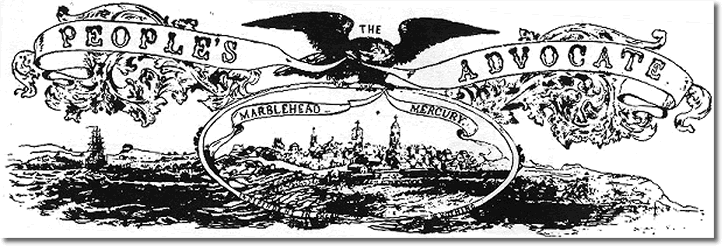
The People's Advocate/Marblehead
Mercury nameplate bears a striking resemblance to another nameplate
appearing weekly in Marblehead, even today. The Advocate's front
page was designed and drawn by none other than Robert D. O. Orne.
Robert D. O. Orne did the engraving used as the nameplate for
the Marblehead Advocate, an early Town newspaper. It was
a view of Fort Sewall and the shipyard section taken from the
Neck, and so beautiful an engraving, that a gentleman from Boston
hired Orne to do a similar view of Lynn.
Throughout the remained of the 19th century two Ornes dominated
Marblehead's history: Adoniran C. Orne and his nephew Jonathan
H. Orne.
Adoniram had owned a shoe factory and had served as Town Meeting
Moderator. Adoniram, who married a Hawkes, was a man always looking
to the future. It is through his efforts that the extension of
Pleasant Street was laid out, greatly facilitating the expansion
and growth of Marblehead. He tried for years to make Redd's Pond
a reservoir, to have laid from it water pipes connected to hydrants
throughout the Town to used in fighting fires. Finally, in May,
1877, the Town voted $10,000 to carry out Adoniram's plan, placing
him on the committee in charge. Who knows whether, if the Town
had heeded Adoniram's advice years earlier, it could have avoided
the great fire that swept through the Town less than six weeks
after the vote, leaving 1500 Marbleheaders out of work. Eleven
years later, as another great fire swept through the Town, his
nephew Jonathan H. Orne would chair the Relief Committee set
up to aid the new sufferers.
Jonathan H. Orne was equally farsighted. He and John Harris obtained
a charter in 1865 to organize a company to establish more direct
railroad lines between Marblehead and Boston, which proved to
be a boon to the Town's infant tourist trade. Jonathan, whose
father was a cordwainer and a representative to the legislature,
also served the Town for four years as a Selectman (1861, 1862,
1863 and 1868). In that capacity he gave countless speeches,
welcoming home Civil War soldiers, memorializing national and
local figures, and celebrating Town events.
Jonathan Orne gave the address at the cornerstone laying of Abbot
Hall, in 1876. The location of the building had caused a great
stir; there were some who did not want the building erected on
the Old Training Grounds. In his speech, Jonathan was the practical
diplomat. Rallying the Town together now that the decision had
been made, he stated, "...if the public good be our aim
as citizens, we shall now cease all further controversy and unitedly
labor to crown this ancient hill with an institution of practical
usefulness to this and future generations...."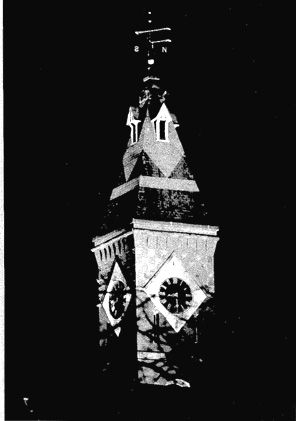
Five years later, Orne presided over the largest gathering ever
held to date at Abbot Hall when President Chester A. Arthur visited
the Town. The President's yacht anchored in Marblehead Harbor,
and President Arthur left for a meeting in Salem. In the
Abbot Hall... "to this and
future generations." -- Jonathan Orne.
interim, a meeting was held in Marblehead to see what action
the Town would take towards observing the visit of the President.
This was a great occasion, for as Orne was to state in his speech,
"not since Andrew Jackson, had a President visited Marblehead."
Jonathan Orne was named Chairman of the greeting committee. It
was decided that a fire truck would be parked to block the street
to prevent the President's carriage from passing, so that the
carriage would be forced to stop at Abbot Hall. Orne put out
a call to "all citizens, irresponsive of party, to give
the President a welcome" by meeting at Abbot Hall at the
appointed hour. The committee's plan worked. Thousands turned
out. President Arthur spoke briefly to the people after Orne's
opening remarks welcoming the President to "this ancient
Town."
The Modern Day Orne Family
The Ornes are no longer cordwainers, sea captains, national political
leaders, or wealthy merchants, but they do still live in Marblehead
and make their individual contributions to the Town in which
their family has lived for over 275 years.
About 75 Ornes, representing four generations, gathered in the
summer of 1981 to honor Fred Orne, Sr., on his 90th birthday.
Marblehead Magazine spoke with many of them that day about their
family and their birthplace.
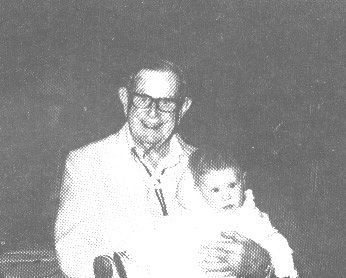
Fred, spry and full of the devil as a nonagenarian, clearly enjoyed
growing up in the Town of his forebears, because as he put it,
"It was wide open. But it was nothing special being one
of the oldest families; I was too busy working so I could feed
my eight children."
Fred Orne, with his great granddaughter,
Shannon Spellman, daughter of Sally Orne.
Fred has worked at Litchman's printing shop since 1910, and has
owned it for about the past twenty years. He roamed the Town
taking photographs, followed Mary Pickford around when she making
a movie on the Neck, and he took photographs of the Curtiss-Wright
airplanes during World War I and from the airplanes, too, as
they soared over the Town. Many a summer stock theater star would
come to his basement studio for publicity shots while playing
in Marblehead. Unfortunately, many of these plates have been
destroyed over the years.
Fred's father was William Hawkes Orne. According to his daughter,
Madeline, "He weighed over two hundred pounds. His mother
taught him to sew, and he could sew as good as any woman."
One of the first mass manufacturers of women's clothing, he owned
a skirt factory in New York which employed hundreds of garment
workers. Madeline who "had such a good time living in Marblehead,"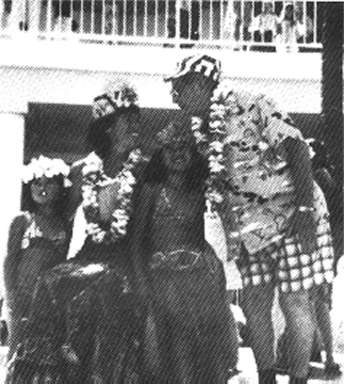 taught
third grade at the Gerry School for forty-six years and states
that, "All the Marblehead youngsters were smart. They were
the same in my first year of teaching as in my last." taught
third grade at the Gerry School for forty-six years and states
that, "All the Marblehead youngsters were smart. They were
the same in my first year of teaching as in my last."
Fred was an adventurer. Being an avid skier, mountain climber,
and a world traveler, he always gathered his children and grandchildren
with him to share these adventures. "He
Fred bends over to kiss bikini-clad
young women in Hawaii.
taught us to respect nature," explained his son Bud Orne,
head of the Marblehead Recreation Department. "He taught
us to enjoy life, not destroy it."
Majorie "Putt" Mace accompanied her father across the
globe tracing her maternal grandfather's(Captain John Lindsey)
route as a sea captain and merchant. "I've been around the
world and Marblehead looks better every time we've come back!"
she exclaimed.
Geoff Lynn, Fred's great-grandson, traveled with him to California,
Florida, and Washingon, D.C. "My great-gradfather kept up
with everybody."
Often Frank Orne, Jr. happily accompanied his grandfather on
trips. He remembers his grandfather as a man who knew no fear.
He recalled a story his father told him about one expedition
Fred, Sr. had taken oto climb the Old Man in the Mountain in
New Hampshire.
"My grandfather was taking pictures on top of the Old Man
in the Mountain. He backed up too far and fell over the side.
Fortunately, he landed on one of the chains used to support the
stones, but, more amazingly, during his fall, he had taken another
picture! So when his sons leaned over to see whether their father
was dead or alive, all Fred yelled up was, "I got the picture!"
Indeed, Fred, Sr. attributes his longevity, in part to fearlessness,
"No worry, no fear, and I love burlesque."
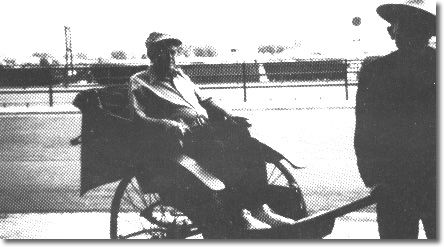
Frank Orne's father, Frank, Sr., who died in 1980, worked for
the Electric Light Department in Marblehead. Frank, Sr. had been
an atomic welder at General Electric during World
Fred rickshawed in style in Hong.
War II, flew on the one flight of the world's only diesel-powered
airplane, and had the unlikely nickname of "Pig." As
his son explained, "The family lived on State Street and
kept ten pigs there. My father and his friends used to ride the
pigs down State Street right into the harbor. The Town passed
an ordinance that prohibited the pigs from being kept there any
longer. My father ran away with the pigs. As the Townspeople
searched all over for them, he had rounded them back to their
sty on State Street."
What many young people and newcomers in Marblehead seem to forget
is the the Town fifty years ago was quite rural, much smaller
in population and definitely self-sufficient. These three qualities
are what the older generations miss most about the changes which
have come to their Town. "Why you can't even go to Salem
anymore, unless you take your own car," stated Fred. "There
aren't trains anymore, and strangers are running the Town now."
Evelyn Glass, one of Fred's daughters, explained, "Everybody
knew everyone else and took care of each other. I didn't even
know there was any other place than Marblehead."
While many of the Ornes have left Marblehead, the ones who remain
have a deep and abiding affection for their Town. Frank Orne,
Jr., who works out on Route 128, would not consider living anywhere
else. "Marblehead with its traditions, is unique. I loved
growing up here, and I eventually want to give something back
to the Town. Newcomers and tansients come here and want a good
time, but they don't want to put anything back into the Town;
they have no pride in Marblehead."
These same sentiments are echoed by Frank's uncle, Bud Orne.
"There's a lack of morale amoung too many of the adults
and kids. People throw little and glass; they don't care. I'd
like to clean up this Town. When I was growing up, we had no
playgrounds, no public tennis courts, no parks, except Seaside.
We used to play baseball at Sweet's Flat, back of where Reynold's
Playground now is. It was the outfielder's job to keep the cows
out. I wanted to something for the kids in the Town."
But left behind his 36 years of barbering to head the Recreation
and Park Department. He has worked hard to provide all sorts
of athletic programs for children of all ages and to help expand
the Marblehead system of parks, so outfielders no longer need
to keep the cows out.
His great-nephew, Gary Orne, a senior in college, had similar
thoughts. "I have a sense of pride and history about my
family. I want to end up in Marblehead and continue the Orne
tradition of public service."
Gary's father, Ray Orne and Ray's sister, Evelyn Glass, both
said they "never made a big deal out of being an Orne."
Ray continued, " It's up to to make my own name."
Yet they all seemed to pass onto their children a sense of history
of the family, and a love for the Town. Evelyn Glass stated,
"I was born on Circle Street, I live on Circle Street, and
I'll probably die there."
Her brother Bud summed it up best about living in Marblehead
when he said, "Everything I want is right here in Marblehead."

The Orne Family Reunion, 1981, on the occasion
of Fred's 90th birthday. Front
row: sitting on the floor,
left to right: Danyell Blasczak, Steve Risoldi, Corey Smith,
Jackson Spellman, and Laura Spellman. Second row: Kneeling,
left to right, Andy Preece, Eric Glass, Peter Orne, Steve
Orne, Kristin Orne, Sandy Orne, Sarah Orne, Tabby Glass, Jason
Glass, and Kelly Glass. Third row: standing, left to right:
Marjorie Mace (who identified all the people in this picture),
Constance Blake, Barbara Lynn, Raymond Mace, Stella Orne, Betty
Blasczak, Cheryl Adams, Marilyn Adams, Marie Blasczak, Debbie
Blasczak, Madeline Orne, Fred Orne, Cindy Adams, Nancy Briggs,
Sandy Spellman, Shanna Spellman, Ann Glass, Evelyn Glass, Nancy
Glass, Clara Orne, Muriel Orne, Bud Orne, Gerry Orne, Kenny Glass,
Susan Smith, Brad Smith,and Bob Smith. Fourth row: standing
behind the third row, left to right: Michael Lynn, Ray Orne,
Roge Risoldi, Joan Risoldi, Roger Blake, Bob Preece, John Adams,
Don Glass, Raymond Blasczak, Chester Blasczak, Randy Briggs,
Brian Glass, Bob Orne, Frank Orne, Marge Orne, Emery Glass, Laurie
Preece, Charlene Preece, and Don Orne.
Carin M. Gordon,
is an attorney who grew up in Marblehead, has loved the good
old Town her whole life, "always will." In High School
she was the editor of the school newspaper, Headlight,
and now practices in Salem. |







 taught
third grade at the Gerry School for forty-six years and states
that, "All the Marblehead youngsters were smart. They were
the same in my first year of teaching as in my last."
taught
third grade at the Gerry School for forty-six years and states
that, "All the Marblehead youngsters were smart. They were
the same in my first year of teaching as in my last."
